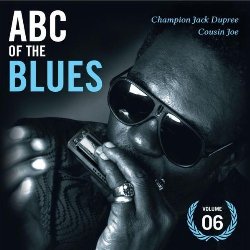ABC of the Blues CD7 (2010)
ABC of the Blues CD7 (2010)

CD 7 Leroy Carr & Scrapper Blackwell - Pee Wee Crayton 07-01 Leroy Carr & Scrapper Blackwell – Wrong Man Blues 07-02 Leroy Carr & Scrapper Blackwell – Gettin’ All Wet 07-03 Leroy Carr & Scrapper Blackwell – Blue with the Blues 07-04 Leroy Carr & Scrapper Blackwell – Christmas in Jail, Ain’t That a Pain 07-05 Leroy Carr & Scrapper Blackwell – That’s Tellin’em 07-06 Leroy Carr & Scrapper Blackwell – Papa Wants a Cookie play 07-07 Leroy Carr & Scrapper Blackwell – The Dirty Dozen 07-08 Leroy Carr & Scrapper Blackwell – Carried Water for the Elephant 07-09 Leroy Carr & Scrapper Blackwell – Let’s Disagree 07-10 Leroy Carr & Scrapper Blackwell – Papa’s Got Your Water On 07-11 Pee Wee Crayton – Win-O 07-12 Pee Wee Crayton – I Got News for You 07-13 Pee Wee Crayton – Blues Before Dawn play 07-14 Pee Wee Crayton – Don’t Break My Heart 07-15 Pee Wee Crayton – The Telephone Is Ringing 07-16 Pee Wee Crayton – California Women 07-17 Pee Wee Crayton – Blues for My Baby 07-18 Pee Wee Crayton – Dedicated to the Blues 07-19 Pee Wee Crayton – Phone Call from My Baby 07-20 Pee Wee Crayton – Blues After Hours
Leroy Carr (March 27, 1905 – April 29, 1935) was an American blues singer, songwriter and pianist, who developed a laid-back, crooning technique and whose popularity and style influenced such artists as Nat King Cole and Ray Charles. He first became famous for "How Long, How Long Blues" on Vocalion Records in 1928.
Carr was born in Nashville, Tennessee. Although his recording career was cut short by his early death, Carr left behind a large body of work in his blues recordings.[2] His partnership with the guitarist, Scrapper Blackwell combined his light bluesy piano with a melodic jazz guitar, that attracted the sophisticated urban black audience. His vocal style moved blues singing toward an urban sophistication and influenced such singers as T-Bone Walker, Charles Brown, Amos Milburn, Jimmy Witherspoon, Ray Charles among others.
Count Basie and Jimmy Rushing used some of Carr's songs and Basie's band shows the influence of Carr's piano style. His music has been covered by notable artists such as Robert Johnson, Ray Charles, Big Bill Broonzy, Moon Mullican, Champion Jack Dupree, Lonnie Donegan and Memphis Slim.
Francis Hillman "Scrapper" Blackwell (February 21, 1903 – October 7, 1962[2]) was an American blues guitarist and singer; best known as half of the guitar-piano duo he formed with Leroy Carr in the late 1920s and early 1930s, he was an acoustic single-note picker in the Chicago blues and Piedmont blues style, with some critics noting that he veered towards jazz. Blackwell was given the nickname, "Scrapper", by his grandmother, due to his fiery nature.
Known for being withdrawn and hard to work with, Blackwell established a rapport with pianist Leroy Carr, whom he met in Indianapolis in the mid-1920s, creating a productive working relationship. Carr convinced Blackwell to record with him for the Vocalion label in 1928; the result was "How Long, How Long Blues", the biggest blues hit of that year. Blackwell and Carr toured throughout the American Midwest and South between 1928 and 1935 as stars of the blues scene, recording over 100 sides Blackwell made several solo excursions; a 1931 visit to Richmond, Indiana to record at Gennett studios is notable. Blackwell, dissatisfied with the lack of credit given his contributions with Carr, was remedied by Vocalion's Mayo Williams after his 1931 breakaway. In all future recordings, Blackwell received equal credit with Carr in terms of recording contracts and songwriting credits. Blackwell's last recording session with Carr was in February 1935 for the Bluebird label.
Connie Curtis Crayton (December 18, 1914 – June 25, 1985), known as Pee Wee Crayton, was an American R&B and blues guitarist and singer.
In a Living Blues article in the 1980s, he stated that friend and singer, Roy Brown, gave him the nickname. This makes sense since Brown had a way of making nicknames for many of his friends. It has also been said that his father gave him the nickname as a tribute to a local Texas piano player.
Crayton began playing guitar seriously after moving to California in 1935 and settling in San Francisco. While there he absorbed the music of T-Bone Walker, but developed his own unique approach. His aggressive playing contrasted with his smooth vocal style, and was copied by many later blues guitarists.
In 1948 he signed a recording contract with Modern Records.[3] One of his first recordings was the instrumental, "Blues After Hours", which reached #1 in the Billboard R&B chart late that year. Its B-side, the pop ballad "I'm Still in Love With You", and the quicker "Texas Hop", were good examples of his work, but his style was of its time and Crayton found it difficult to progress.
Last Updated (Sunday, 22 January 2012 10:59)








